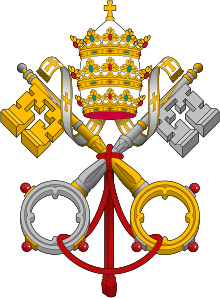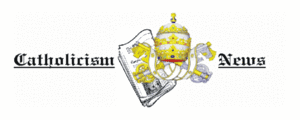Introduction The Catholic Church, also known as the Roman Catholic Church, is the largest Christian church, with 1.39 billion baptized Catholics worldwide as of 2022. It is among the world's oldest and largest international institutions, and has played a prominent role in the history and development of Western civilization. The church consists of 24 sui iuris churches, including the Latin Church and 23 Eastern Catholic Churches, which comprise almost 3,500 dioceses and eparchies located around the world. The pope, who is the bishop of Rome, is the chief pastor of the church. The Diocese of Rome, known as the Holy See, is the central governing authority of the church. The administrative body of the Holy See, the Roman Curia, has its principal offices in Vatican City, a small independent city-state and enclave within the Italian capital city of Rome, of which the pope is head of state. The core beliefs of Catholicism are found in the Nicene Creed. The Catholic Church teaches that it is the one, holy, catholic and apostolic church founded by Jesus Christ in his Great Commission, that its bishops are the successors of Christ's apostles, and that the pope is the successor to Saint Peter, upon whom primacy was conferred by Jesus Christ. It maintains that it practises the original Christian faith taught by the apostles, preserving the faith infallibly through scripture and sacred tradition as authentically interpreted through the magisterium of the church. The Roman Rite and others of the Latin Church, the Eastern Catholic liturgies, and institutes such as mendicant orders, enclosed monastic orders and third orders reflect a variety of theological and spiritual emphases in the church. Of its seven sacraments, the Eucharist is the principal one, celebrated liturgically in the Mass. The church teaches that through consecration by a priest, the sacrificial bread and wine become the body and blood of Christ. The Virgin Mary is venerated as the Perpetual Virgin, Mother of God, and Queen of Heaven; she is honoured in dogmas and devotions. Catholic social teaching emphasizes voluntary support for the sick, the poor, and the afflicted through the corporal and spiritual works of mercy. The Catholic Church operates tens of thousands of Catholic schools, universities and colleges, hospitals, and orphanages around the world, and is the largest non-government provider of education and health care in the world. Among its other social services are numerous charitable and humanitarian organizations. (Full article...) Selected article
 Vix Pervenit: On Usury and Other Dishonest Profit was an encyclical, promulgated by Pope Benedict XIV on November 1, 1745, which condemned the practice of charging interest on loans as usury. Because the encyclical was addressed to the Bishops of Italy, it is generally not considered ex cathedra. The Holy Office applied the encyclical to the whole of the Roman Catholic Church on July 29, 1836, during the reign of Pope Gregory XVI. The encyclical codified Church teachings which date back to early ecumenical councils, at a time when scholastic philosophy (which did not regard money as a productive input) was increasingly coming into conflict with capitalism. Though never formally retracted, the encyclical's relevance has faded as the Church retreated from actively enforcing its social teachings in the financial sphere, and as the practice of charging interest on loans became almost universally accepted—legally and ethically.
Selected image
 Credit:Click picture for information 6th century mosaic in Ravenna portrays Jesus dressed as a philosopher king in a cloak of Tyrian purple. He appears as the Pantokrator enthroned as in the Book of Revelation, with the characteristic Christian cross inscribed in the halo behind his head. Selected biography
 Joan of Arc, or Jeanne d'Arc in French, (c. 1412 – May 30, 1431) was a 15th century national heroine of France. She was tried and executed for heresy when she was only 19 years old. The judgment was overturned by the Pope and she was declared innocent and a martyr 24 years later. She was beatified in 1909 and canonized as a saint in 1920. Joan asserted that she had visions from God which told her to recover her homeland from English domination late in the Hundred Years' War. The uncrowned King Charles VII sent her to the siege at Orléans as part of a relief mission. She gained prominence when she overcame the dismissive attitude of veteran commanders and lifted the siege in only nine days. Several more swift victories led to Charles VII's coronation at Reims and settled the disputed succession to the throne. Did you know...
Related portalsFeast Day of June 10
Selected quote

News
SubcategoriesTopics
The Holy Bible:
Particular Churches (grouped by liturgical rite):
Things you can do
External resourcesWikiProjectsAssociated WikimediaThe following Wikimedia Foundation sister projects provide more on this subject:
Discover Wikipedia using portals |
































